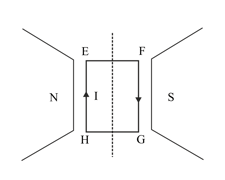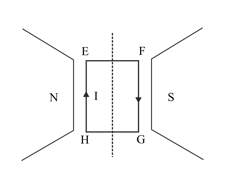S L Arora Solutions for Chapter: Magnetic Effect of Current, Exercise 6: Text Based Exercises
S L Arora Physics Solutions for Exercise - S L Arora Solutions for Chapter: Magnetic Effect of Current, Exercise 6: Text Based Exercises
Attempt the free practice questions on Chapter 4: Magnetic Effect of Current, Exercise 6: Text Based Exercises with hints and solutions to strengthen your understanding. New Simplified Physics (Vol 1) For Class 12 solutions are prepared by Experienced Embibe Experts.
Questions from S L Arora Solutions for Chapter: Magnetic Effect of Current, Exercise 6: Text Based Exercises with Hints & Solutions
Derive an expression for the torque acting on a loop of turns, area , carrying current , when held in a magnetic field . With the help of a circuit diagram, show how a moving coil galvanometer can be converted into an ammeter of given range. Write the necessary mathematical formula.
Two straight long parallel conductors carry currents and in the same direction. Deduce the expression for the force per unit length between them. Depict the pattern of magnetic field lines around them.
A rectangular current carrying loop is kept in a uniform magnetic field, as shown in Figure.

What is the direction of the magnetic moment of the current loop?
A rectangular current carrying loop is kept in a uniform magnetic field, as shown in Figure.

When is the torque acting on the loop maximum, zero?
With the help of a diagram, explain the principle and working of a moving coil galvanometer.
What is the importance of a radial magnetic field and how is it produced?
Why is it necessary to introduce a cylindrical soft iron core inside the coil of a galvanometer?
"Increasing the current sensitivity of a galvanometer may not necessarily increase its voltage sensitivity". Justify this statement.
